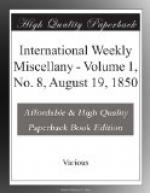For the artist this is a very important arrangement, which enables him to endure a thousand inconveniences.
There is no prospect of a better state of the Polish drama. Count Fedro may, in his comedies, employ the finest satire with a view to its restoration, but he will accomplish nothing so long as the Generals ride the theater as they would a war horse. On the other hand, no Russian drama has been established, because the conditions are wanting among the people. That is a vast empire, but poor in beauty; mighty in many things, but weak in artistic talents; powerful and prompt in destruction, but incapable spontaneously and of itself to create anything.
* * * * *
“Death’s jest book, or the Fool’s tragedy.”
The Examiner, for July 20, contains an elaborate review, with numerous extracts, of a play just published under this title in London. “It is radiant,” says the critic, “in almost every page with passion, fancy, or thought, set in the most apposite and exquisite language. We have but to discard, in reading it, the hope of any steady interest of story, or consistent development of character: and we shall find a most surprising succession of beautiful passages, unrivaled in sentiment and pathos, as well as in terseness, dignity, and picturesque vigor of language; in subtlety and power of passion, as well as in delicacy and strength of imagination; and as perfect and various, in modulation of verse, as the airy flights of Fletcher or Marlowe’s mighty line.
“The whole range of the Elizabethan drama has not finer expression, nor does any single work of the period, out of Shakspeare, exhibit so many rich and precious bars of golden verse, side by side with such poverty and misery of character and plot. Nothing can be meaner than the design, nothing grander than the execution.”
In conclusion, the Examiner observes—“We are not acquainted with any living author who could have written the Fool’s Tragedy; and, though the publication is unaccompanied by any hint of authorship, we believe that we are correct in stating it to be a posthumous production of the author of the Bride’s Tragedy; Mr. Thomas Lovell Beddoes. Speaking of the latter production, now more than a quarter of a century ago, (Mr. Beddoes was then, we believe, a student at Pembroke College, Oxford, and a minor,) the Edinburgh Review ventured upon a prediction of future fame and achievement for the writer, which an ill-chosen and ill-directed subsequent career unhappily intercepted and baffled. But in proof of the noble natural gifts which suggested such anticipation, the production before us remains: and we may judge to what extent a more steady course and regular cultivation would have fertilized a soil, which, neglected and uncared for, has thrown out such a glorious growth of foliage and fruit as this Fool’s Tragedy.”




